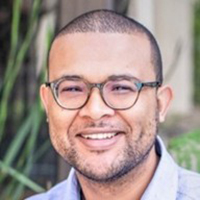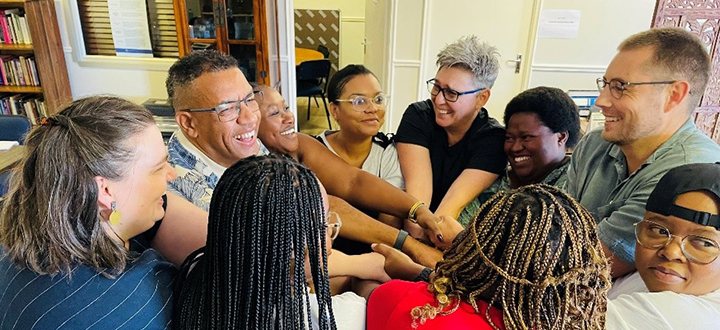College of Human Sciences
Using sacred text to fight gender and sexuality discrimination
In Africa, as in many other parts of the world, the way people read and interpret the Bible is often a key factor in inciting violence against the lesbian, gay, bisexual, transgender, intersex and queer plus (LGBTIQ+) community. Christianity, as the dominant religion in Africa, is often at the forefront, condemning LGBTIQ+ people based on biblical texts.

Dr Hanzline R Davids
From 28 to 29 January 2025, Dr Hanzline R Davids, a lecturer at Unisa’s Department of Gender and Sexuality Studies in the College of Human Sciences (CHS), facilitated a workshop with Inclusive and Affirming Ministries (IAM), based in Cape Town. IAM is one of the oldest queer faith-based organisations, founded in 1995. The organisation works towards "the full recognition, celebration, and participation of LGBTIQ+ people in faith communities across Africa". IAM will be 30 years old this year.
The workshop was based on a book chapter by Davids, entitled "Contextual Bible reading in practice: reflections from the NGO landscape on sexual diversity in Africa", which was published in a book entitled Challenging contextuality: Bibles and biblical scholarship in context (2024). This book was edited by Louise J Lawrence, Peter-Ben Smit, Hannah M Strømmen and Charlene van der Walt. The book chapter is based on one of IAM’s resources, the Reading Together Toolkit, which brings contextual Bible study, intercultural Bible reading and IAM’s theory of action together in a process that encourages workshop participants to read, interpret and apply biblical texts in a responsible manner that stops violence and discrimination against LGBTIQ+ people in Africa.
As a previous staff member of IAM, the organisation permitted Davids to describe how the toolkit worked after he moved to Unisa in 2021. As part of the workshop, Davids also facilitated various group activities that strengthened communication, leadership, collaboration and problem-solving – all key ingredients for enabling teams in the field.
According to Reverend Ecclesia De Lange, "Hanzline facilitated this process in such a way that it has ignited a renewed interest in developing adequate resources and encourages ongoing reflection on IAM's work and processes".

IAM staff members strengthen communication, leadership, collaboration and problem-solving during the human knot activity
Davids sees this workshop as a space for meaningful collaboration between academia and civil society, fostering reciprocal knowledge exchange. As an engaged scholar, Davids believes this workshop was centred on marginalised voices, challenging dominant narratives, and fostering transformative knowledge production that bridges academia and civil society in the service of humanity.
* By Dr Hanzline R Davids, Lecturer: Department of Gender and Sexuality Studies, and Katlego Pilane, Communications and Marketing Office, CHS, with input from ChatGPT
Publish date: 2025/03/05

 Unisa co-hosts G20 community outreach in the Eastern Cape
Unisa co-hosts G20 community outreach in the Eastern Cape
 Unisans gain membership of prestigious science academies
Unisans gain membership of prestigious science academies
 Advocating for disability transformation through servant leadership
Advocating for disability transformation through servant leadership
 Unisa Press continues to illuminate the publishing space
Unisa Press continues to illuminate the publishing space